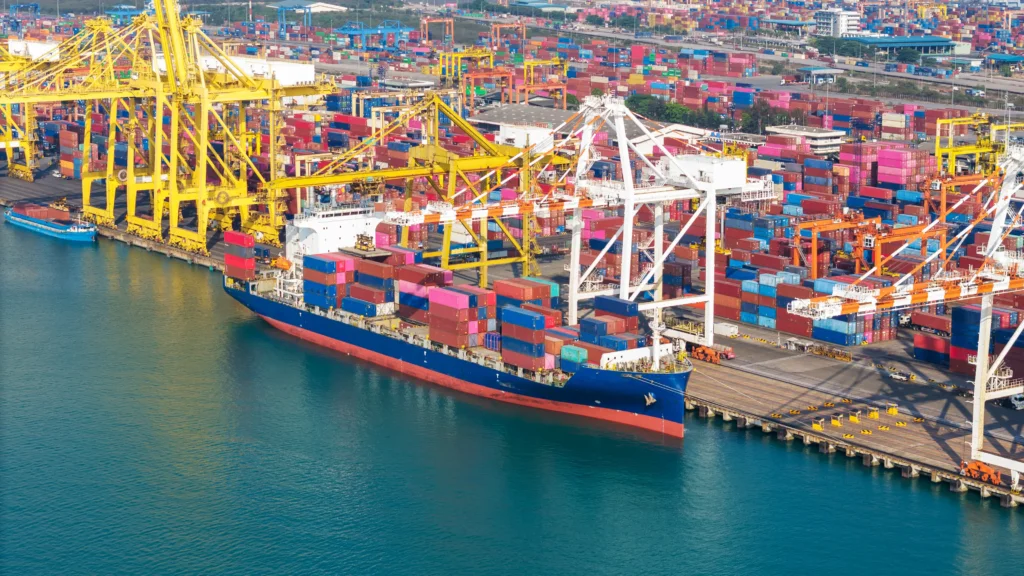Rotterdam, Europe’s largest port, recorded a 1.4% growth in transshipment over the first three months of 2024. The port managed 110.1 million tons of cargo compared to 111.7 million tons in the previous year. The principal cause for the decrease in throughput was a reduction in the liquid bulk category, which represents nearly 50% of total transshipments.
In this category, 52.6 million tons of products were handled, showing a 3.1% decline year-on-year. Notable decreases were observed in the crude oil segment (almost 2%) and petroleum products (3.4%). Lower fuel imports suggest that the economic slowdown persists. Nevertheless, it is important to highlight that LNG transshipments were 3.6% higher year-on-year, reaching 9.1 million tonnes.
There was also a 4.5% year-on-year decrease in dry bulk cargo, totalling 17.1 million tons. The significant drop in coal transshipment, by 27% to 5.4 million tons, largely contributed to this decline. Transshipments of agricultural products fell by 23%, while iron ore transshipments rose by 16%, linked to increased demand from Germany where steel production is growing.
Ro-ro cargoes declined by 3.8% year-on-year to 6.3 million tons. However, the volume of general cargo handled increased by a solid 7.4%, with a total of 1.5 million tons of this cargo type being transshipped.
The best in three Years
For the first time in three years, the first quarter saw an increase in handled containers. This improvement was 3.3% in tonnes and 2% in TEU (20-foot equivalent units). From January to March, the Port of Rotterdam handled 3.3 million TEU, despite the ongoing crisis in the Red Sea.
“After the increase in container transshipment, we see the first signs that global trade is recovering. However, these signals remain uncertain due to rising global tensions,” states Boudewijn Siemons, CEO of the Port of Rotterdam Authority.
According to the release, container volumes significantly dropped in January and February, particularly on routes from Asia. But March showed a strong rebound. Additionally, the need to bypass the Suez Canal means that cargo destined for Mediterranean ports is often redirected via Rotterdam, boosting traffic between Rotterdam and Mediterranean ports by 29% in the quarter.
Impressive March
The port of Antwerp-Zeebrugge handled 70.4 million tons of cargo in the first three months of the year, marking a 2.4% increase year-on-year. The boost in container transshipment, contributing significantly to the increase in handled cargo, is a positive signal.
During January-March 2024, the port transshipped 3.287 million TEU, a 6% increase year-on-year. Measured in tonnes, container throughput was up by 8.6% year-on-year to 36.8 million tons. Moreover, in March, container transshipment achieved the best monthly result since March 2021.
Diesel and coal dragging down volumes
However, other cargo categories recorded declines. General cargo throughput fell by 7.8% year-on-year to 2.3 million tons. Ro-ro cargo, totaling 5 million tons, showed a decrease of 6.9% compared to the first quarter of 2023. Congestion at terminals handling this cargo type was blamed. The transshipment of transport equipment saw significant declines, with used cars down over 52%, trucks by almost 24%, and new cars by 5.5%. For the latter, 860,000 units passed through the Belgian port during the period January-March 2024.
Dry bulk cargo also saw a sharp decline of 12.1% year-on-year to 3.5 million tons. The drop was particularly stark in imports, which decreased by 24.4%, compared to a 9.7% drop in exports. There was a significant reduction in coal transshipment, by over 68%, due to a mild winter, and notable declines were also recorded in cereals (by 47%) and sand and gravel (by 12%). However, increases were noted in scrap (by 5.7%) and non-ferrous metals (by 47%).
Liquid bulk cargo, the second largest category in terms of transshipment volume, practically maintained last year’s volumes at 22.8 million tonnes, a slight decrease of 0.9%. Increases were recorded in the transshipment of fuel oil (by 25%), gasoline (12%), and LNG (10%). However, after many quarters of growth, there were significant declines in diesel (by 40%), LPG (by 11.5%), and the entire category of liquid fuels (by 11.4%).
A rebound in the transshipment of chemicals, severely affected by the economic slowdown, was a positive sign, with a 5% increase year-on-year, and kerosene transshipments increased by 12%.
Hamburg also down
The third largest port in Europe, Hamburg, handled 27.4 million tons of cargo on the Elbe, a decrease of 3.3% compared to the previous year. This overall downturn was driven by a significant decline in the transshipment of bulk goods, which fell by 11.9% to 8.2 million tons. The decline in liquid cargo was especially noticeable due to high reserve levels established during the early stages of the war in Ukraine.
American boom
The German port also recorded an increase in container volume in the first quarter of this year, with 1.9 million TEU handled on the Elbe – a 1.1% increase year-on-year. In tonnes, the increase was 0.7% (up to 19 million tons).
“This signals the stabilisation of world trade,” notes Axel Mattern, head of marketing at the port. However, he adds that “quarterly data cover a short period of time and do not necessarily determine transshipment trends for the rest of the year.”
Analysis of container traffic in a German port shows that while trade with China dominates (536,000 TEU), there has been a notable increase in volume with the United States. Transshipments to and from this country increased by 17.7% year-on-year to 179 thousand TEU.
Spanish Growth
Among other significant European ports, major Spanish ports have released their results. The port in Algeciras achieved a transshipment of 26.6 million tons in the first quarter of 2024, an increase of 3.3% over the previous year. The main driver was liquid cargo, with 7.5 million tons transshipped (14% more year-on-year). Container traffic also improved, up by 4.6% to 1.17 million TEU.
Conversely, the port in Valencia boasted a 12% increase in container transshipment, reaching 1.2 million TEU. Total transshipments reached 17.1 million tons, over 8% more year-on-year, largely thanks to container volumes.
Photo by Bernd 📷 Dittrich on Unsplash









